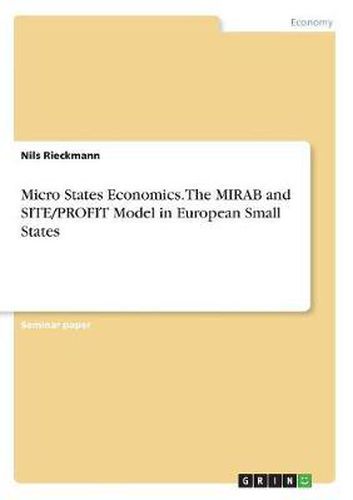Readings Newsletter
Become a Readings Member to make your shopping experience even easier.
Sign in or sign up for free!
You’re not far away from qualifying for FREE standard shipping within Australia
You’ve qualified for FREE standard shipping within Australia
The cart is loading…






Seminar paper from the year 2017 in the subject Economics - International Economic Relations, grade: 1,7, University of Gottingen, course: Micro States (Seminar), language: English, abstract: Being socioeconomically successful is a task in itself. However, being socioeconomically successful as a Small State seems to be a more difficult task. If you look at the gross domestic product per capita you might not find a correlation between a low GDP per capita and the smallness of a state. If you take a look at the GDP in absolute numbers you will find a correlation. GDP figures often cover up economic troubles which Small States experience. The problem consists in the higher vulnerability of Small States, in general and economic terms. Briguglio has pointed out how smallness hampers economic growth and/or makes it dependant on others. To give some examples: Small Economies depend on imports from foreign markets because their smallness prohibits the production of any goods beyond agriculture necessities. To benefit from the human productivity rise Small (Island) States often import more than they can export. As a result of that foreign investors are needed to survive the trade deficit in the long run. Moreover, Economies of Scale is not possible and the fix costs are relatively high. If the Small State is an island, remoteness makes the situation even more difficult. Large stocks are necessary and the per-unit transport costs are enormous. Especially Small Islands States are dependant on external markets and external financing if they want a living standard that is near to the average living standard of the world. The literature has mainly pointed out three strategies for tackling vulnerability as a Small Island State: The MIRAB Model, the SITE Model, the PROFIT Model. In particular Bertram and McElroy have put a lot of work into analysing and classifying these concepts. They mainly focussed on small island economies in the Caribic and in Oceania. That leads to the qu
$9.00 standard shipping within Australia
FREE standard shipping within Australia for orders over $100.00
Express & International shipping calculated at checkout
Stock availability can be subject to change without notice. We recommend calling the shop or contacting our online team to check availability of low stock items. Please see our Shopping Online page for more details.
Seminar paper from the year 2017 in the subject Economics - International Economic Relations, grade: 1,7, University of Gottingen, course: Micro States (Seminar), language: English, abstract: Being socioeconomically successful is a task in itself. However, being socioeconomically successful as a Small State seems to be a more difficult task. If you look at the gross domestic product per capita you might not find a correlation between a low GDP per capita and the smallness of a state. If you take a look at the GDP in absolute numbers you will find a correlation. GDP figures often cover up economic troubles which Small States experience. The problem consists in the higher vulnerability of Small States, in general and economic terms. Briguglio has pointed out how smallness hampers economic growth and/or makes it dependant on others. To give some examples: Small Economies depend on imports from foreign markets because their smallness prohibits the production of any goods beyond agriculture necessities. To benefit from the human productivity rise Small (Island) States often import more than they can export. As a result of that foreign investors are needed to survive the trade deficit in the long run. Moreover, Economies of Scale is not possible and the fix costs are relatively high. If the Small State is an island, remoteness makes the situation even more difficult. Large stocks are necessary and the per-unit transport costs are enormous. Especially Small Islands States are dependant on external markets and external financing if they want a living standard that is near to the average living standard of the world. The literature has mainly pointed out three strategies for tackling vulnerability as a Small Island State: The MIRAB Model, the SITE Model, the PROFIT Model. In particular Bertram and McElroy have put a lot of work into analysing and classifying these concepts. They mainly focussed on small island economies in the Caribic and in Oceania. That leads to the qu